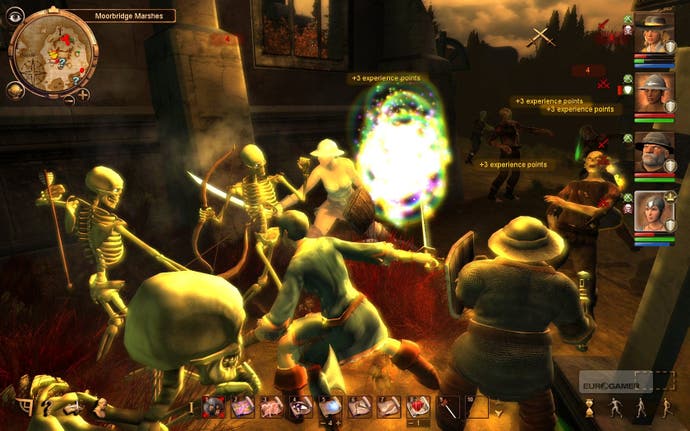Drakensang: The Dark Eye
I love a party with a happy atmosphere +4.
I spent about an hour with my entire party wandering around stinking and suffering penalties to their communication after beating up a load of smelly gelatinous cubes. Most of the standard healing, anti-poison, anti-effect stuff didn't shift it. I was reconciling myself with a future of being the most puissant and most pungent warriors in the land, until when bashing open a barrel (yes, it's the sort of trad-RPG where barrels remain your most common foe, at least for obsessive compulsives) I found... some soap. Phew. But you could have hinted, you know?
The quest Drakensang throws you into is somewhere between Baldur's Gate and Icewind Dale - it's certainly less chatty than the former, but you have a player-generated hero and pick up others on the way in its style. The greater importance of combat - including dungeons, which are basically a long string of combat encounters - leans it closer to the latter, but there's a lot of more traditional adventuring quests to give it personality.
Drakensang's story is... well, a good enough excuse to go and stomp on a lot of monsters and take their stuff. While you don't get any of the gruelling moral questions of The Witcher, let alone the existential dice-poetry of Planescape Torment, it burbles along happily enough and manages to be charmingly funny upon occasion. My initial impression of the game was "Imagine playing D&D with a competent, yet uninspired DM". Further play expands that to "Imagine playing D&D with your mate - who's a competent, yet uninspired DM". Drakensang seems like your mate. It's easy to like.
It really is at its best in its mechanics, however. Putting aside the complexity of builds the more free-form system allows, combat has enough unfamiliar elements to lead to difficult questions. As well as losing hit-points, your characters also accumulate wounds if hit in certain ways. Each wound weakens them, and doesn't repair itself until you receive medical attention. Get more than four, and you pass out. In other words, in combat you're not just worrying about dying - you're worrying about dying in a variety of ways. While there are sections of the game which descend to the standard beat-the-monsters romp, there are bits which really do demand attention, thought, and running away and coming back later.

However, even accepting the game for what it is, there are a fair few elements where it fails on its own remit. It's got a terrible habit of spreading its objectives about, requiring a lot of traipsing - to the point where I see the fans are fiddling with files to increase the team's movement speed. And in combat, it's got a tendency towards twitchiness. You order an attack in a certain place, and all the characters - including the enemies - end up running around to accommodate it. When it's an attack which didn't really look like your character required to move at all, and disrupts the battle line totally, it's frustrating. Hard battles becoming harder because of the precision of the control system is annoying - though it's worth noting it's nowhere near as bad as Neverwinter Nights 2 was on release.
Drakensang is a fine RPG which looks better than it is, due to the relative dearth of similar games on the PC in recent times. As far as reasonable-budget party-based RPGs go, it's detailed enough to fill the months until we see whether Dragon Age is going to live up to BioWare's legacy. And if Dragon Age fails, RPG fans will have no shame in returning to Drakensang's rock-solid, dependable arms of holding. I like it a lot.
